6/5/2025 Day 18 –
TBA
6/4/2025 Day 17 – Meditation in Many Forms: A Quiet Return to the Self
Today at Dharma Drum Mountain, we followed the guidance and explored a variety of meditation practices in different settings, inside and outside the classroom, slowly walking in the rain, facing the mountain, watching nature, listening to birds chirp, and even experimenting with different mouth shapes to create distinct sounds, humming, and more. At the end of this one-day-long visit, we drank tea as a form of Zen practice. The message was clear: meditation can take many forms. Sometimes, even actions like writing calligraphy or making tea can be meditative. The point is to do something, or not do anything at all, in a way that calms the mind, slows down our thoughts, and helps us focus on simply being. This is something we often need most amid our fast-paced lifestyles.
Meditation, I kid you not, has been something I have wanted to do for a long time. At one point, I even considered partitioning a room in my home just for that purpose. Before this trip, I had already understood the power of meditation, the ability to settle the mind in a hectic world and remain calm in the midst of chaos. Meditation costs almost nothing, requiring only five minutes of your time and almost no equipment. I am so glad that during this trip, we had multiple opportunities to practice it and that students had the chance to experience it, maybe for the first time.
Too often, I see people glued to their phones, scrolling through one video after another, letting content flood their minds without realizing that it is slowly numbing their awareness and shrinking their attention span. I am guilty of this, too. Sometimes, after a long, exhausting day of work, I zone out in front of my phone or computer, chasing some mindless entertainment to give myself a mental break. But there is a better way to rest the mind: meditation. Do not get me wrong, I still enjoy watching those funny short videos. But I also want to be more mindful and avoid spending an entire break on them. Instead, I hope to carve out time for meditation, which nourishes the mind far more than the junk food of random social media posts from people I do not even know. Sure, I may occasionally laugh at a meme or a silly post, but that kind of content is like cheap carbs – fun at the moment but not truly sustaining.
Once this program ends, I plan to make a conscious effort to meditate more regularly. Most likely, I will simply sit quietly and take a few deep breaths. I probably will not go as far as humming or making strange vocal sounds…people might think I have lost my mind. But the core idea remains: take a moment, be still, and return to yourself.
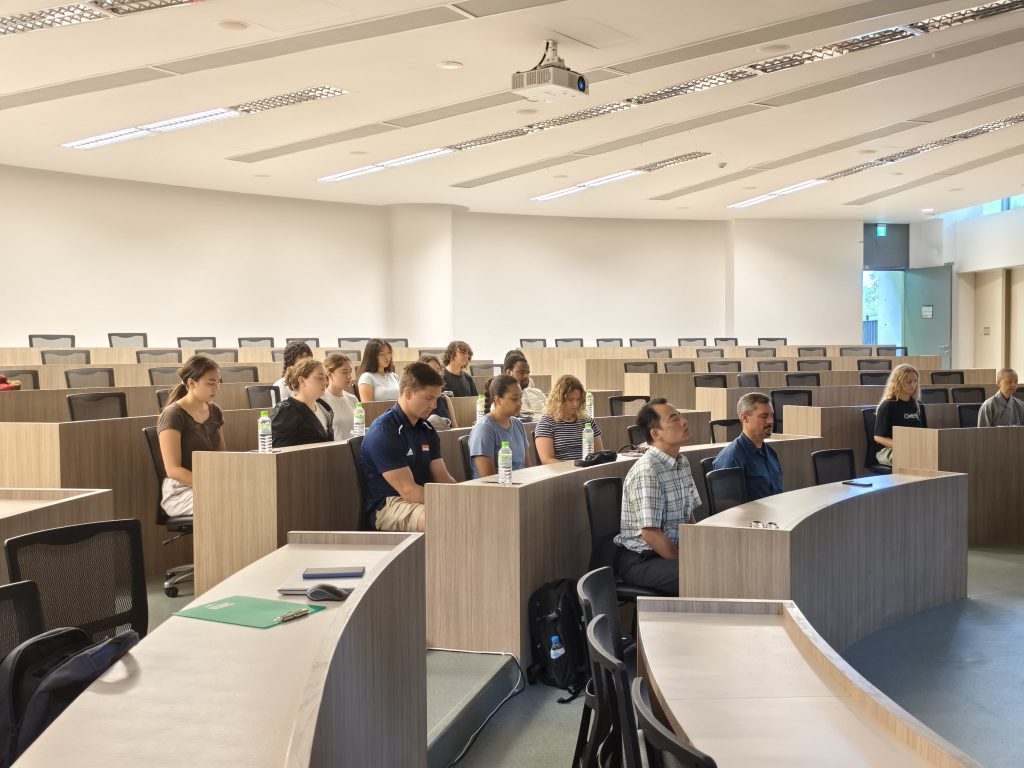
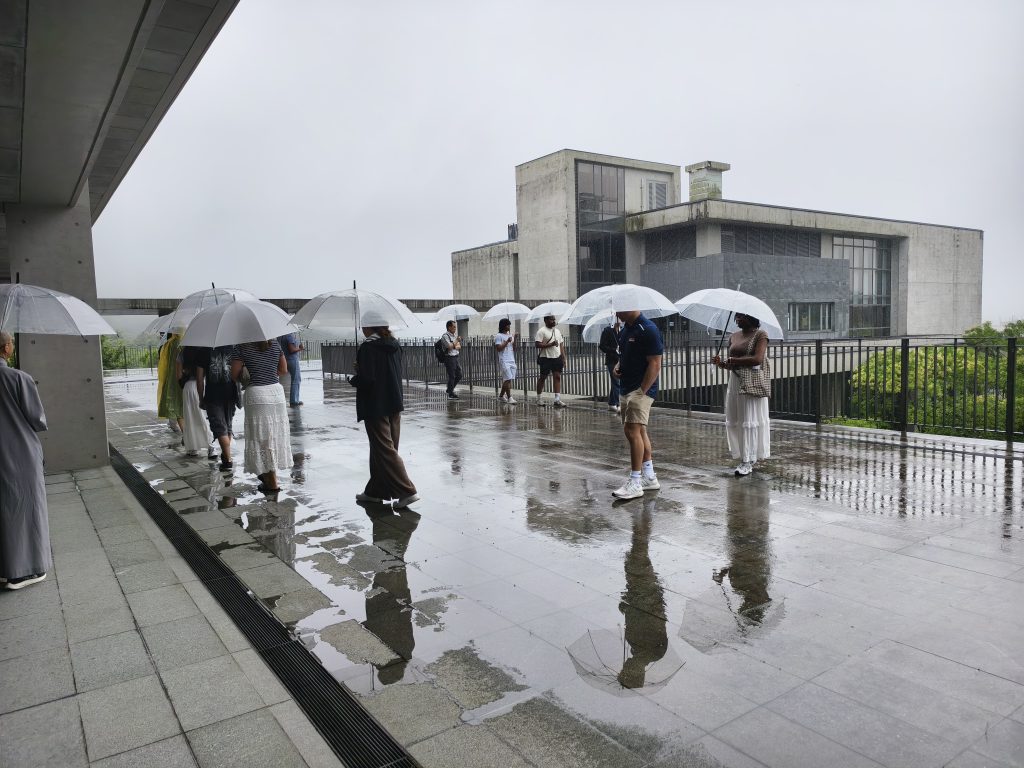
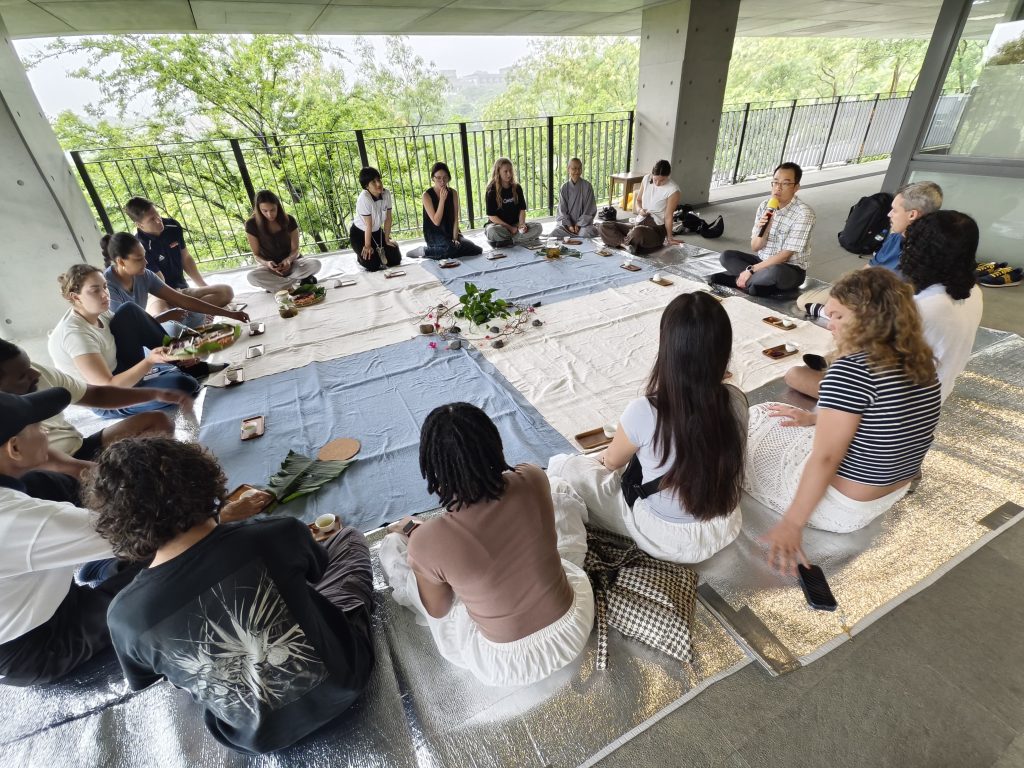
6/3/2025 Day 16 – Tasting Freshness, Not Taking It for Granted
My daily reflection for June 3rd is about the cooking class we had in the morning. I am not sure how others felt, but I know I really enjoyed it, both the cooking part and especially the eating part. From zhongzi (rice dumplings) to boba tea, everything tasted so good, probably because we made it all by hand and got to eat it fresh. I honestly believe that the secret to any delicious food is how fresh it is when you eat it. Of course, that may not apply to everything, but generally, food tastes better when consumed right away. The boba we made, for example, tasted amazing.
The students were divided into three groups. After watching Chelsea, the owner of the cooking class, demonstrate each step, the students followed along and tried it themselves. I have to say, things always look easier when someone experienced is doing it… But I was really impressed by how quickly the students picked things up. Folding the dumpling leaves, layering the fillings, rolling out the boba pearls, it all looked a bit tricky at first, but they managed very well. One course after another, they seemed engaged and genuinely enjoying the experience.
That said, I could not help but think about how different real-life cooking is. What made this class so enjoyable was how well-prepared everything was. All the ingredients and condiments were already portioned out and neatly arranged. The rice was cooked, the utensils were ready, and the space was set up for us to just walk in and begin. We also got to leave after eating, no need to deal with the cleanup, which is usually half the battle in any kitchen. The actual cooking, I feel, is often not the hardest part. It is the prep work and the cleaning afterward that make cooking feel like a chore.
Another thing that stood out to me was how smoothly everything went. There were no idle moments. We flowed from one item to the next without much waiting around. Such seamless coordination does not happen by accident. It takes a lot of planning and experience. I am sure Chelsea put in a great deal of effort to make it all look and feel effortless. And because of that, we were able to fully enjoy the class. I really appreciate the amount of work that must have gone into making that experience so smooth and enjoyable.
Here is what I walked away thinking: Whenever we get to enjoy something, whether it is a meal, a tour, or even a smooth travel day, there is often a lot of unseen work behind it, done either by us or, more often, by someone else. Like all the places we have visited on this trip, our local guide is usually the one quietly dealing with the stressful parts when things do not go as planned. My point is we should try not to take things in life for granted. Behind every enjoyable moment, there is usually someone doing the hidden work to make it all possible. And for that, I feel grateful.
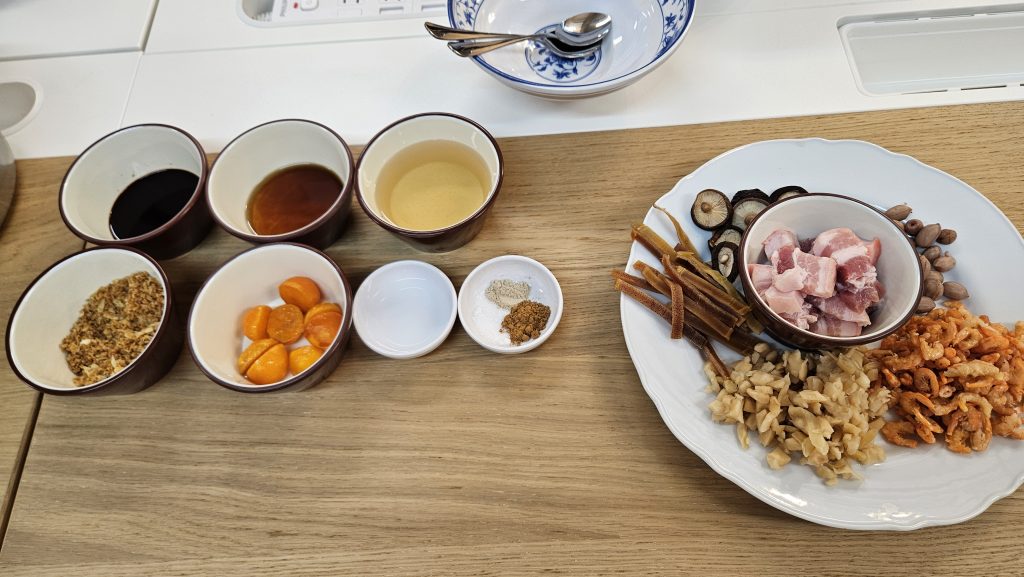
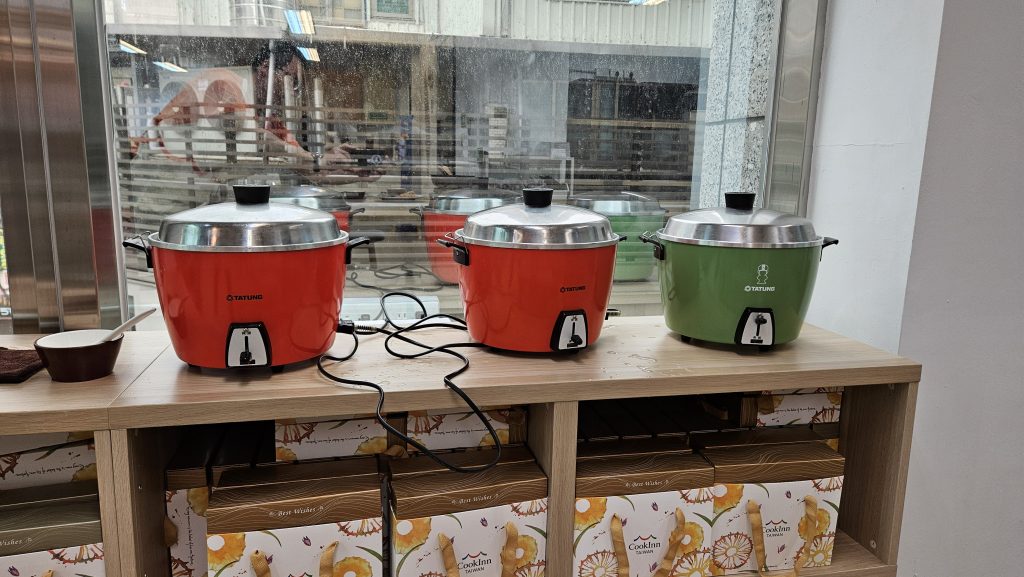
6/2/2025 Day 15 – Culture, Tradition, and the Burden of Tourism
On June 2nd, we visited many places in one day. In the morning, we had a company visit, during which we observed the business models of a media production company and explored its various business ventures. It was fascinating because I had never been exposed to the business model of this industry before.
What followed later in the day was part of a popular and well-traveled itinerary. We first visited the Jinguashi Gold Mine Museum, but due to the Dragon Boat Festival, the museum was closed. So we headed to Jioufen, a well-known spot in New Taipei City. It is famous for its beautiful scenery overlooking the seashores and for its many delicious Taiwanese snacks. The narrow alleys winding through the blocks, stretching into hidden back streets that lead to local homes, can easily make visitors lose their sense of direction. Fortunately, the views are always rewarding as one tries to find the way to the next stop.
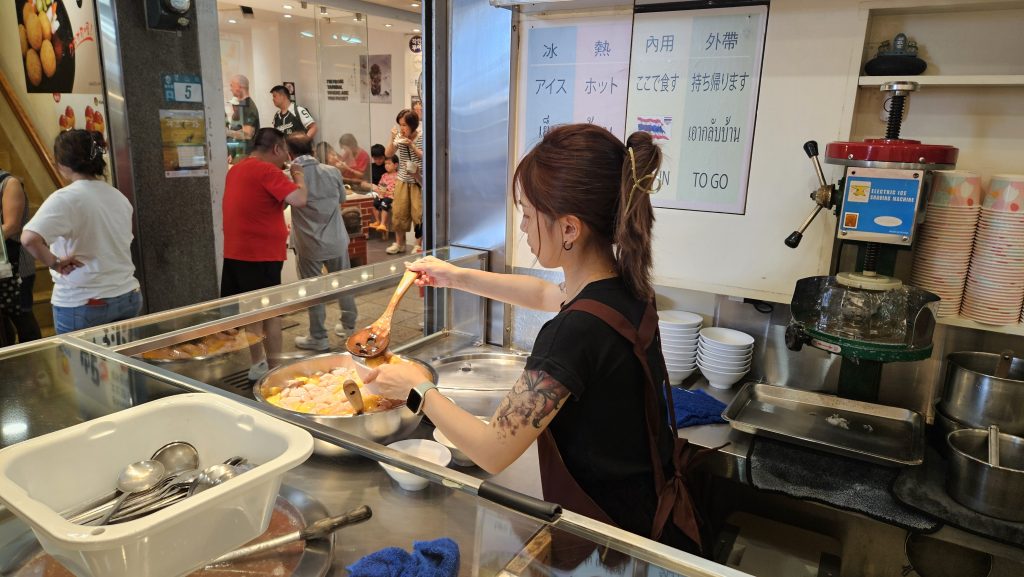
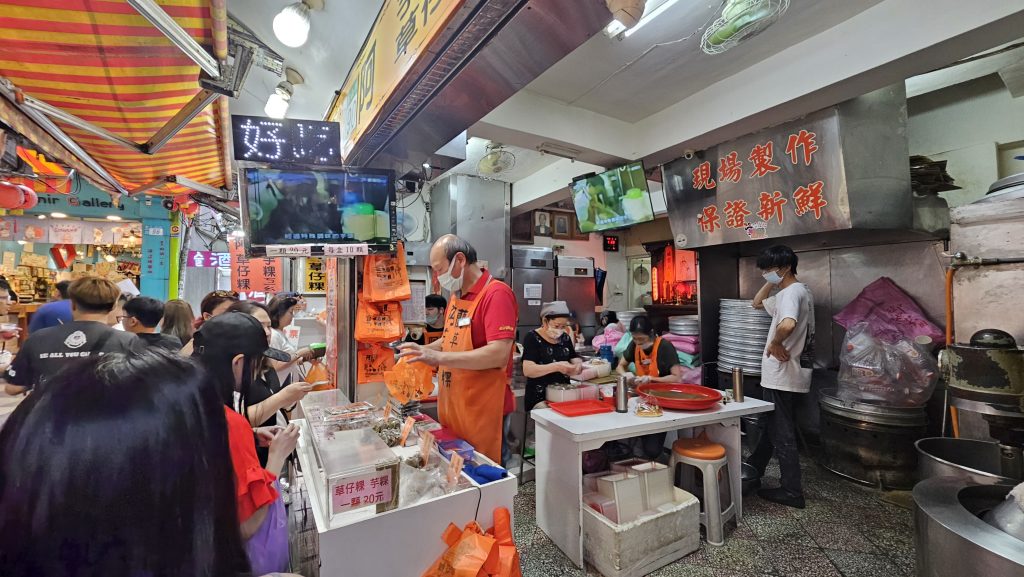
Our next destination was Shifen, where we took part in the sky lantern experience. Everyone seemed excited to participate in this spiritual activity, where we each wrote our wishes on a lantern. These lanterns float into the sky using the principles of hot air balloons, with some spiritual money burning inside to symbolize blessings. Watching the lanterns slowly rise into the sky was a beautiful sight. But I could not help thinking about what happens after they disappear from view. Where do they fall? How much environmental pollution they can cause? Who collects the waste left behind? Knowing that thousands of visitors come here year after year to release these lanterns, I felt compelled to learn more about how the waste is managed.
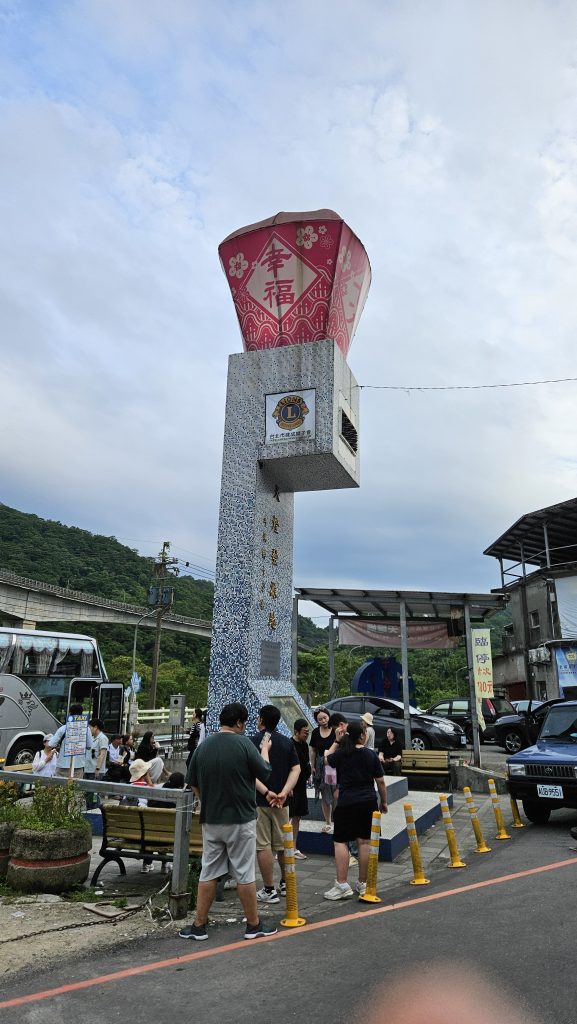
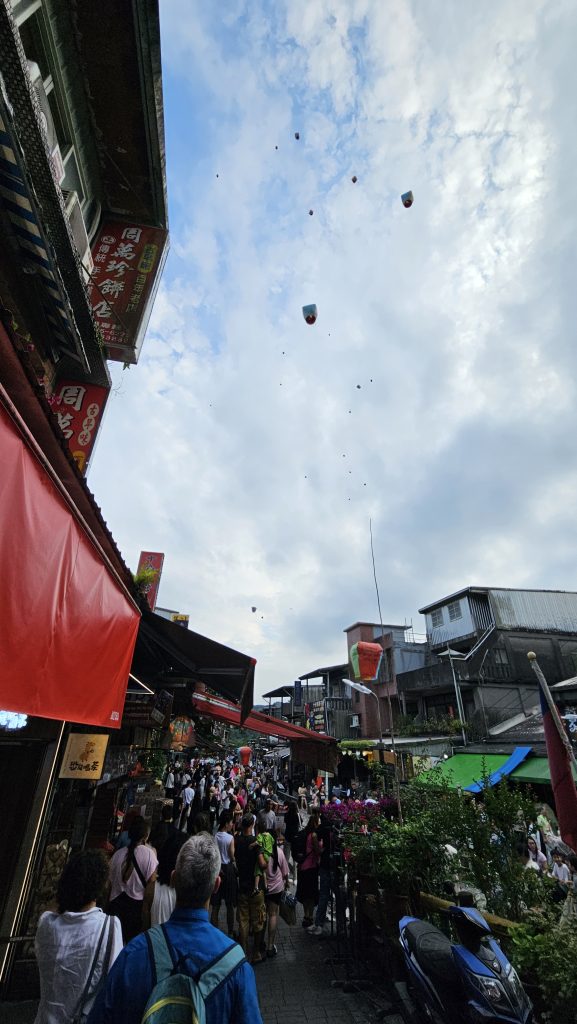
From my brief research, I found that the New Taipei City Government has encouraged civil society groups and volunteers to help clean up the lantern debris in nearby areas. As far as I can tell, these cleanup efforts are mostly irregular and rely on volunteer participation. This is where tourism, environmental protection, and cultural traditions start to conflict. Releasing the lanterns felt meaningful and special, and I understand how tourism supports the local economy. At the same time, I am aware that these activities leave a significant environmental footprint. Should we ban sky lanterns altogether? Should tourists be allowed to release them freely without any restrictions? After participating myself, I feel that either extreme might not be the best answer.
This is something we all need to think about. There should be a middle ground where tourists can still enjoy this unique cultural experience but also be assured that proper waste management is in place. Perhaps the price of each lantern could include a waste disposal or recycling fee. Or maybe tourists could be given the option to donate toward sustaining recycling efforts. Alternatively, the government might allocate a budget specifically for lantern cleanup and environmental protection. In any case, tourism and environmental sustainability must be brought into balance through thoughtful and responsible solutions.
6/1/2025 Day 14 – History I Don’t Know How to Teach, but Can Show
I am not a history teacher, and I don’t think I can explain history in a particularly engaging manner. So, bringing students to Taiwan feels like the most natural and powerful way for them to get to know this place. Taiwan has a complex and often heartbreaking history. Over the past several hundred years, it has been ruled by different powers from various parts of the world. These relentless changes in ruling parties have created tension, friction, confusion, and conflict for the people on this island. Many tragedies have occurred, one of the most painful being the February 28 Incident in 1947. That day left a deep scar in Taiwan’s history. Many people lost their lives, and many more suffered in silence.
I am not old enough to have lived through that difficult time, but today’s visit to the 228 Museum taught me a lot. I learned how that event tore families apart. Now that I have my own family, I can only imagine the pain of seeing a loved one leave home and never return without even a chance to say goodbye.
I know I am fortunate to have been born in a relatively peaceful time in Taiwan, even though martial law was still in effect during my early years. I am fortunate, and I do not take that for granted. That is why I cherish Taiwan’s democracy and freedom so deeply. This island is the place where I was raised, taken care of, and educated. I am who I am because of Taiwan. I love this place. I only wish I could introduce Taiwan to even more people.
Still, I am grateful that I am taking the first step, bringing twelve wonderful students with me to spend three weeks in Taiwan. I love every single one of them. They are the best, and I truly mean that. I just love these students.
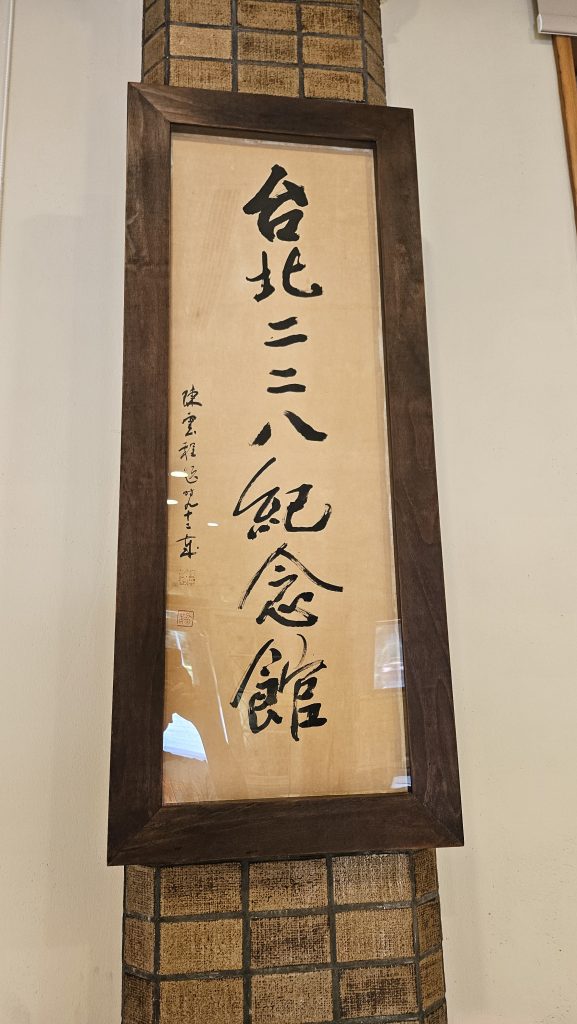
Also, one thing I have come to realize is that many temples in Taiwan actually worship the same gods, but the statues or images of those gods were brought to Taiwan at different times and from different regions of China. I also found it interesting that many temples focus on a specific area of life. The temple we visited today, for example, is dedicated to medicine. The main deity is Baosheng Dadi, also known as the God of Medicine. He is said to be highly skilled in astronomy and geography, compassionate, and a master of healing. Believers pray to Him for good health and healing, and many seek His blessing when they are ill. He has saved countless lives and is deeply respected.
As we visit more temples, I have started to feel increasingly comfortable navigating these sacred spaces. I now have a better understanding of how to worship in the way locals do. What makes me even happier is seeing how my students are also growing in this experience. Many of them now know how to use incense, how to bless the items they purchase in the incense burner, and how to find things that interest them in every corner of the temple. I would not be surprised if, by now, all twelve of my students know more about temple practices than many Taiwanese people!
Watching them worship so sincerely moved me. I could tell that they were genuinely wishing for something close to their hearts. I know that each of them faces their own challenges in life, and they are doing the best they can. Whatever they were praying for today, I genuinely hope their wishes come true.
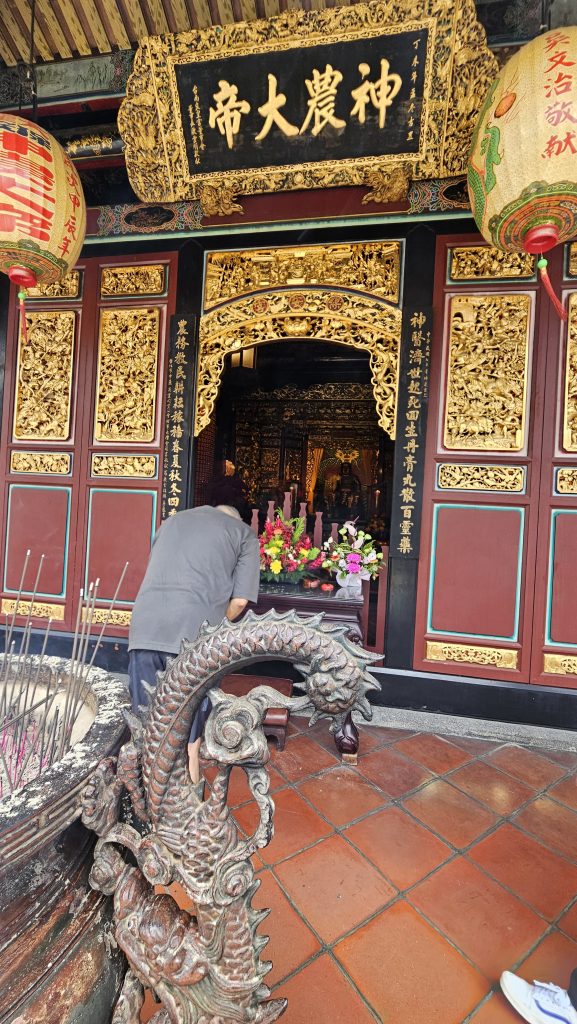
5/31/2025 Day 13 – Seeking Answers at Fo Guang Shan
Today, we visited Fo Guang Shan, one of the four major religious organizations in Taiwan, known not only for its monastic presence but also for its wide-ranging outreach through various affiliated institutions. We spent half a day there, primarily exploring their museum. Fo Guang Shan graciously arranged volunteers and a bilingual nun to accompany us throughout the visit. They guided us through the exhibitions and explained everything in great detail. We were well taken care of, and their thoughtful explanations made the experience even more meaningful. During our visit, we watched a 3-D film, practiced calligraphy, walked through exhibitions, and paid our respects to Buddhist figures. It was a spiritually fulfilling visit.
Throughout the day, we had multiple opportunities to speak with the nuns. This was the first time I had such close interaction with nuns, and I felt deeply moved. I have great respect for them because they have willingly given up all personal desires to pursue a path of spirituality and service to others. That kind of selfless love is something I may never fully grasp in this lifetime. Their sacrifice humbles me. Even more fascinating to me are their insights into life. Their understanding of the world is fundamentally different from mine. They seem to have philosophical answers to almost everything, which I found deeply compelling.
Lately, I have been going through a phase of life where I find myself asking numerous philosophical questions. What is the meaning of life? What am I truly pursuing? How should I face obstacles or failures? How can I find inner peace? What kind of person am I becoming, and how can I improve myself? These are not easy questions, and yet, religion seems to offer some clarity. They call it “enlightenment.” I know I need some form of enlightenment because I often feel lost, unsure of what truly matters. Life is not constant or linear. At different stages, the factors that shape my decisions shift, and so do my goals. How can I know whether the decisions I make today are the right ones?
Thankfully, I left Fo Guang Shan with a few souvenirs, including a book. I believe it may help me begin to find some of the answers I am seeking. Perhaps I should engage more with religion moving forward. In fact, I spoke with Professor Young about the idea of creating a new course that builds on this study abroad program, one that could be offered as a full-semester course in the future. It could be a meaningful way for me to explore religion more deeply and, hopefully, find greater inner peace.
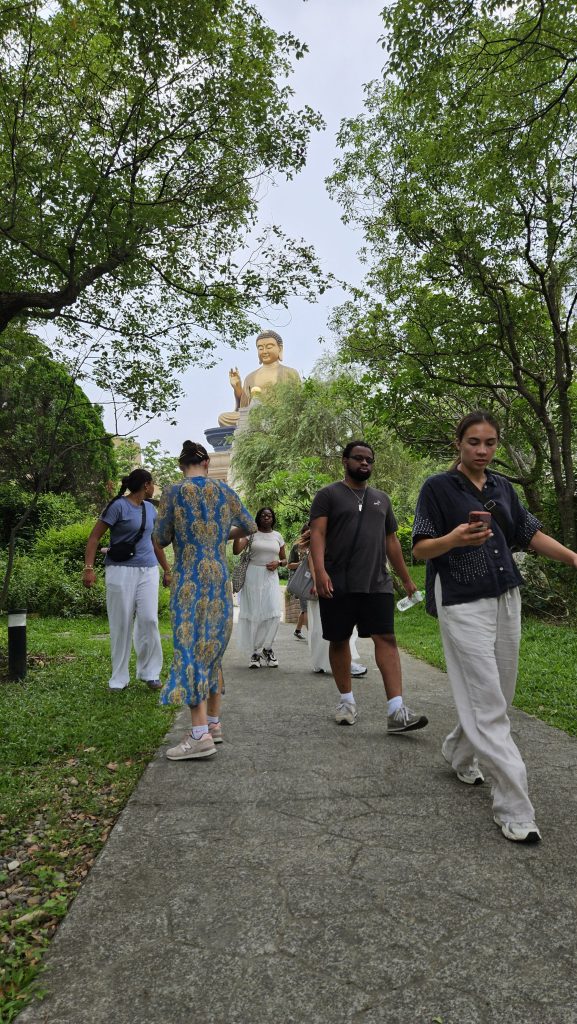
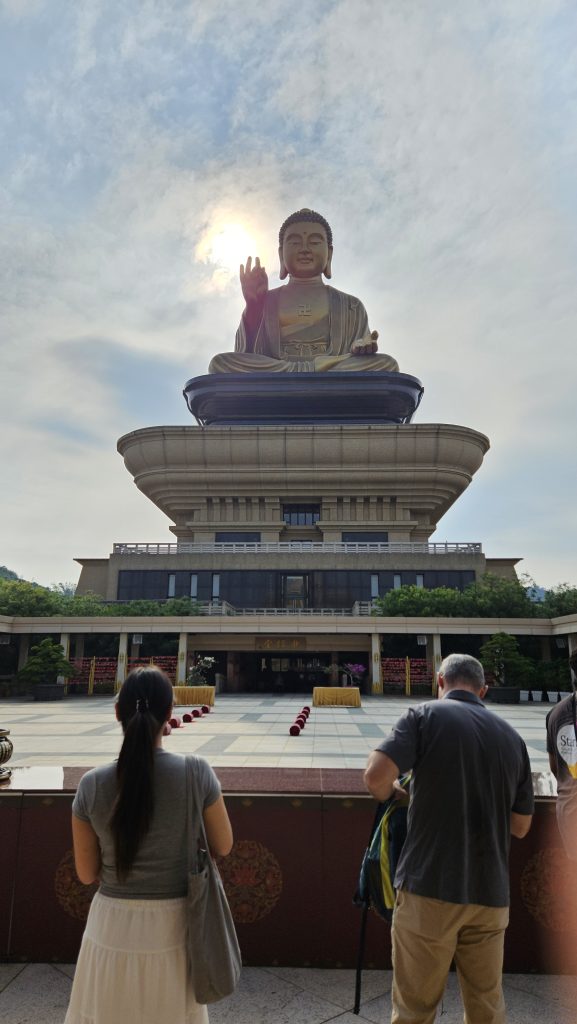
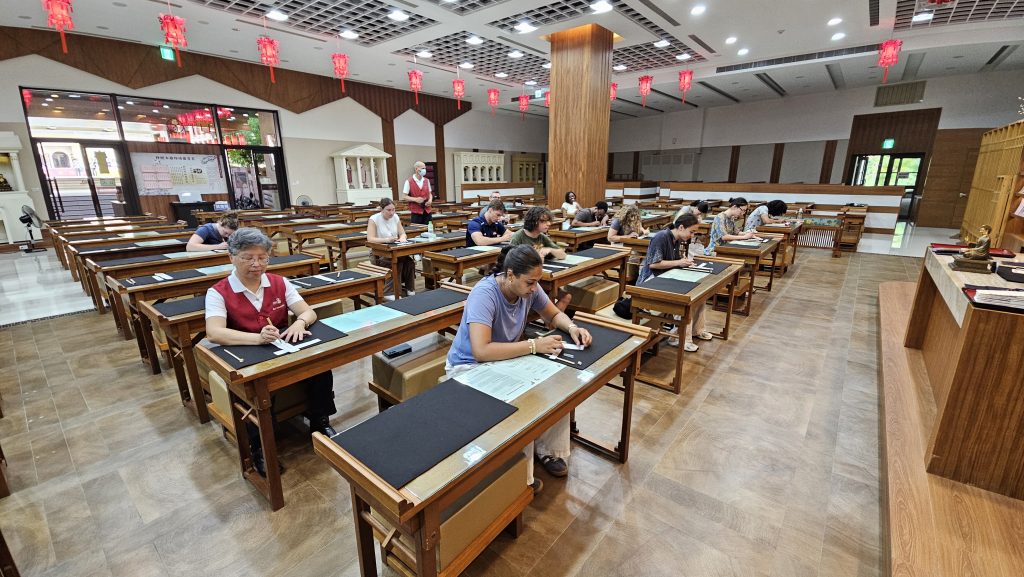
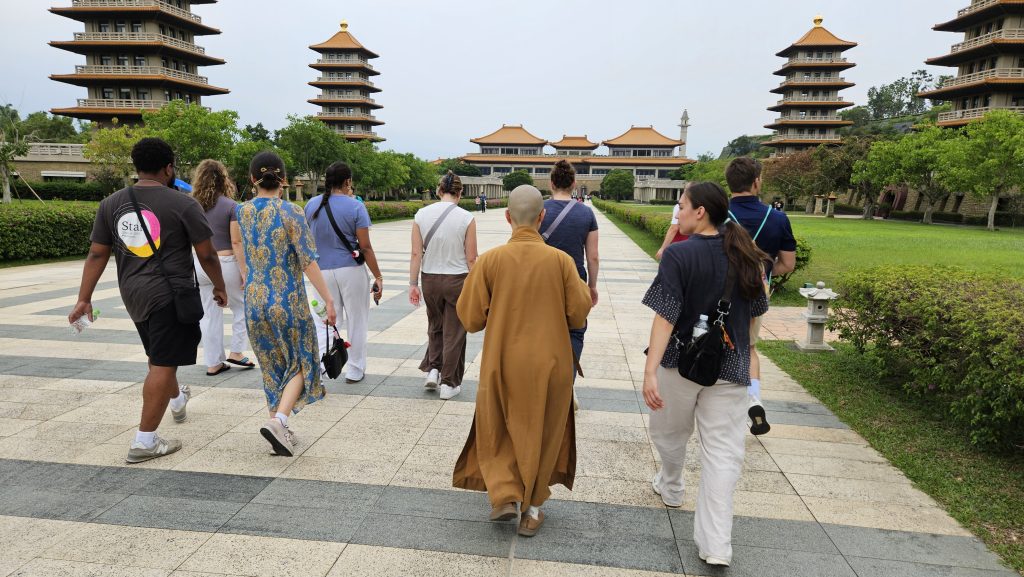
5/30/2025 Day 12 – Twelve Students, One Grateful Heart
Today we visited the Lotus Pond in Kaohsiung. This is where the famous Dragon and Tiger Pagodas stand at the edge of the pond, surrounded by many other massive religious statues. We were so lucky to be able to walk into the recently renovated pagodas and climb all the way to the top of the tower to take in the view. But I have to say, the fence at each floor was just too low, it barely reached my knees, and we were six floors up. My legs turned to noodles because I am afraid of heights. When I was taking photos, I had to grip my phone tightly because I was terrified it might fall. Honestly, I was half crouched the whole time on the top floor. I could hardly enjoy the view. Looking down truly frightened me.
Do you see the photo I attached below? Look how happy I was! On this trip, my joy has been overflowing, because I feel so lucky to be co-leading this program. One time, I overheard some of my students talking on the MRT about what was on their bucket list. I thought to myself, “This Bucknell in Taiwan program is definitely something on my own bucket list.” I have always wanted to introduce Bucknell students to Taiwan, the special place where I grew up.
So far, every student in this program has been doing incredibly well. Everyone has been actively participating and engaging in every activity we planned. They take notes everywhere we go, carefully observe every detail and corner of the temples we visit, pay full attention during company visit presentations, and ask thoughtful questions. They conduct themselves so well that not a single day goes by without me feeling proud of them. Professor Young and I often find ourselves wanting to buy little gifts for them, because they are truly a dream group of students, ones I could have only dreamed of.
Our local guide, Peter, often tells me how impressed he is with them, and I am so proud to hear that.
To my twelve students: I feel blessed to have you join me on this journey. I want to say how deeply grateful I am that you signed up for this program. You have fulfilled one of my dreams. You truly are the best.
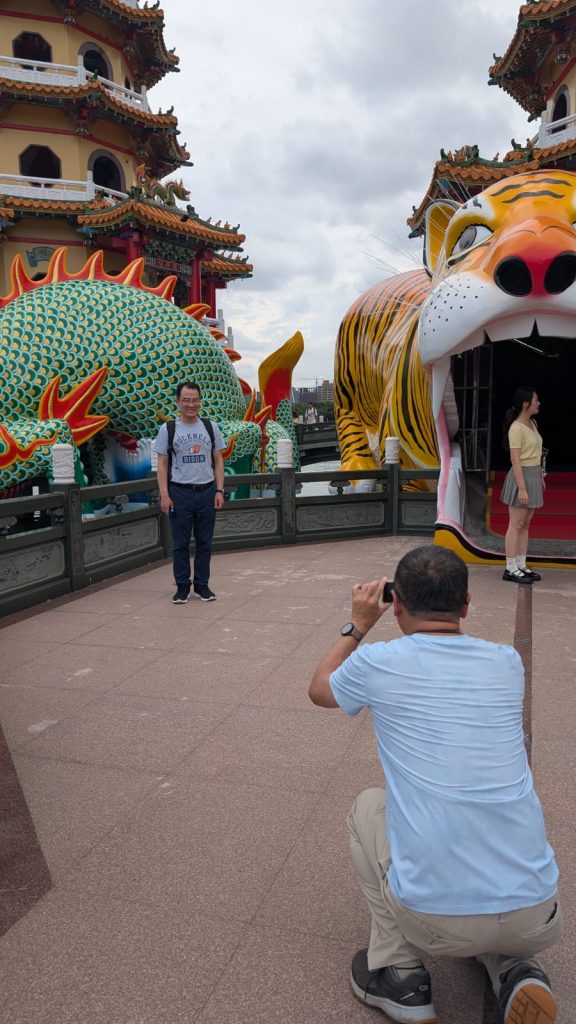
Photo credit: Professor Stuart Young
5/29/2025 Day 11 – The Beauty and Burden of Being Human
Today, we visited the Kaohsiung National Museum of Fine Arts. The building is relatively new and quite magnificent. I loved how clean and spacious the interior felt. What impressed me most was how thoughtfully the lighting, layout, and display of the artworks were designed, each exhibition was arranged in a way that complemented the nature of the artifacts themselves, enhancing the visual experience for viewers.
The museum showcased a diverse range of themes and topics, and I appreciated them all. Not every exhibit was cheerful or optimistic; some explored very dark and unsettling subjects. On the third floor, I encountered a series of installations that told tragic stories of individuals who died in various ways, many of which were deeply tied to mental breakdowns and emotional distress. These stories included heartbreaking scenarios: people jumping from buildings or motorcycles, or using sharp objects to harm themselves due to unbearable psychological pressure or body image issues.

Photo credit: https://www.instagram.com/p/DJyJ0ZuupKV/
Each narrative was accompanied by a small puppet placed inside a glass case, styled with makeup and clothing to depict the person after the event. I could not finish reading every single story, not because I found them too disturbing, but because I needed to head to the Kaohsiung American School to deliver my speech to high school students and their families. I did not want my mental state to remain entangled in those dark moments right before having to cheerfully promote Bucknell University.
Still, during the brief ten minutes I spent in that exhibit, whether the stories were real or fictional, I was struck by how fragile human beings can be. Our minds are incredibly complex and, at times, alarmingly vulnerable to abstract pressures that can result in real, tangible harm.
It reminded me: be kind to everyone around you. You never know what someone is going through, and even the smallest gesture could either save them or be the last straw. More importantly, be kind to yourself. Let go. Sometimes, events happen because the universe has its own way of moving things forward. Do not overly blame yourself. Trust that things unfold as they should. The more we resist or try to push things away, the more those things tend to return and haunt us.
As Master Sheng Yen said: 「面對煩惱時,要清楚辨知煩惱的緣起,然後面對它、接受它、處理它、放下它,這就是佛的智慧。」(“When facing afflictions, clearly understand their origins. Then face them, accept them, deal with them, and let them go. That is the wisdom of the Buddha.”)
5/28/2025 Day 10 – Superstition, Spirituality, and Street Food
I am not sure if students have noticed this phenomenon: almost every temple we have visited, or will visit, tends to be surrounded by small businesses, shops, or eateries, forming a kind of symbiotic ecosystem. Temples in Taiwan are no longer just places of worship; they are vibrant community hubs where people gather for various purposes, including dining, shopping, and socializing.
In contrast, churches in the United States seem to me are often stand-alone buildings with few businesses nearby. This difference highlights how, in Taiwan, the line between religion and daily life is much more blurred. It is not necessary to be religious to participate in religious activities here. Many Taiwanese people casually engage in temple worship, often without knowing whether the temple is Taoist or Buddhist. Worship becomes part of everyday life, and because temples are so widespread, it is easy for people to make offerings or say a prayer during their daily routines.
To make worship more accessible, different deities are believed to oversee specific areas of life, such as real estate, business, academics, love, fortune, and more. The connection between religion and daily life even extends to business decisions and superstitions. For example, many hotels do not have a fourth floor because the word “four” sounds like “death” in Mandarin. Similarly, people avoid writing names in red ink, as folklore, rooted in Buddhist beliefs about reincarnation, suggests that spiritual officials in the underworld use red ink to record the names of those whose lives are ending.
The more temples we visit on this trip, the more I appreciate the deep-rooted religious nature of Taiwanese society. I used to be someone who did not care much about history or religion, and in hindsight, I realize how ignorant that perspective was. Thanks to this study abroad program, I am now enriching the humanistic side of my knowledge and learning to see and value things that were once invisible to me.
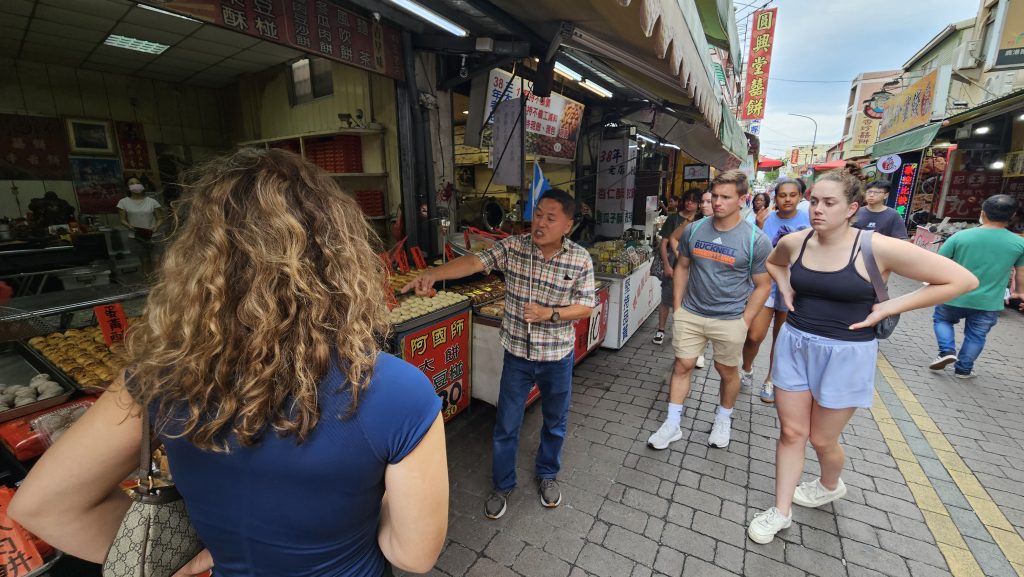

5/27/2025 Day 9 – Finding Color Beyond Work
Today we visited the Rainbow Village. Grandpa Rainbow (Huang Yung-Fu) began painting as a way to cope with loneliness and to save his home from demolition after most of his neighbors had moved away. He started with small drawings inside his house, which gradually grew into vibrant murals covering walls, doors, and streets. His colorful art brought life back to the fading village and became his way of expressing joy and preserving the place he loved.
He was not a professional painter. Most of his works feature geometric shapes and appealing, repetitive patterns. But more importantly, he simply enjoyed doing it, and he did it. He had the courage to pursue something he liked, not because he was skilled or trained, but because it gave him peace and helped him take his mind off the things that troubled him. What started as a personal escape from loneliness became a form of art cherished by the community.
Some of the paintings were clearly damaged. After speaking with a few locals, we learned that this was due to a dispute between Grandpa’s family and vendors using the site for business, leading to vandalism as an outlet for frustration and anger. But that is not what I want to reflect on today.
What I really want to reflect on is Grandpa’s act of doing what he loved. He liked to paint, so he painted. I admire that kind of willpower and determination to follow through on something purely because it brings joy. We all need something in life that helps take our mind off the daily grind. And we should not fear whether we are “good enough” to do it. Starting off poorly is still infinitely better than not starting at all, because once you begin, there is always room to grow.
I am writing this mostly to remind myself to find a hobby I truly enjoy, something that has nothing to do with how good I am at it. Even if I am not naturally gifted at it, so be it. I need something outside of work to relax my mind.
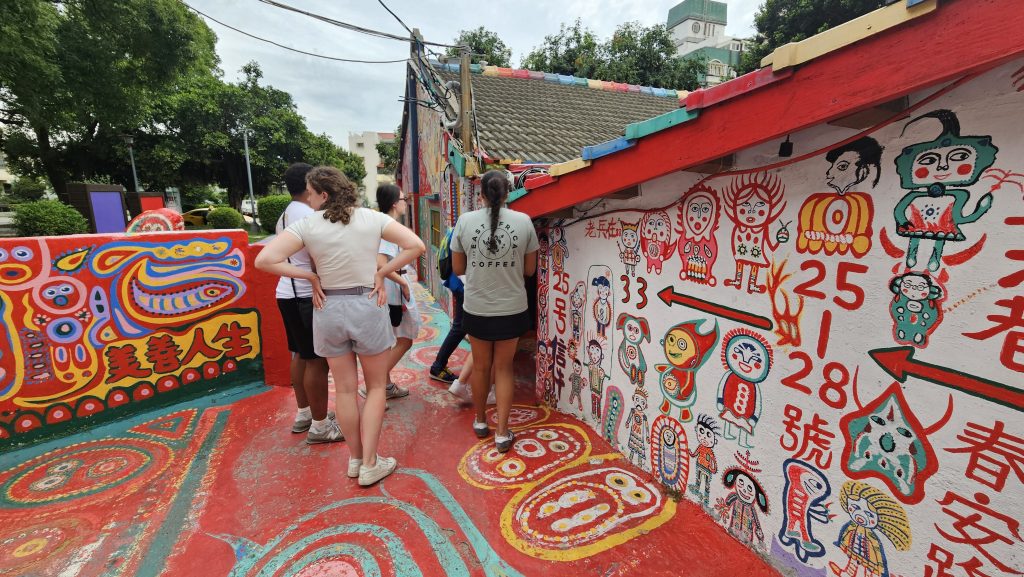
5/26/2025 Day 8 – When Prayers Shape Reality
Today, we visited 台北霞海城隍廟 (Taipei Xia-Hai City God Temple), a site known for its spiritual influence in helping people find their future spouse and in supporting married couples to maintain a happy and lasting relationship. When we arrived, the temple was filled with worshippers, and the wife of the City God was especially revered at that time.
All the deity statues were beautifully crafted and covered in gold plating. The air was thick with the scent of incense, which created a sacred and distinctive atmosphere. The large number of incense sticks burning at once was a clear sign of the temple’s popularity and significance.
I took a moment to worship there, especially paying respects to the wife of the City God. Naturally, I prayed for a long-lasting, joyful marriage and the continued well-being of my family. As I stood in front of the temple altar, I found myself reflecting: Is it the mystical power of the universe that helps make these wishes come true as I express them in prayer, or is it the very act of worshiping, of pausing to articulate these hopes, that serves as a reminder to myself, which in turn influences my behaviors and decisions in a way that brings about the outcomes I seek?
Could this idea of worship as a form of internal reinforcement apply to other deities I have encountered during this study abroad experience? For example, Wenchang Wang (Wenchang Dijun), the Taoist God of Culture and Literature, is often worshiped by students or their parents who hope for good academic performance or admission into top schools. When people sincerely worship him, perhaps the ritual strengthens their internal motivation, making them more committed to studying, more focused, and thus more likely to succeed. In that sense, the prayer becomes a self-fulfilling prophecy.
This study abroad program has given me space and time to reflect on questions I rarely have time to consider during the hectic semester. Religious studies are not only intellectually enriching but also deeply connected to every facet of human experience. On the surface, religion may appear to be just about belief systems, but in truth, it intersects with people, society, history, politics, economics, and more.
Religion is inseparable from humanity. Wherever we go in the world, we find religious practices, some visible, some subtle, but nearly always present.
Why don’t more undergraduates choose religious studies as a major or minor?
Religion studies offer one of the most powerful lenses through which we can understand how the world works, how societies function, how individuals behave, and how we make meaning in our lives. Studying religion is not merely academic; it is a journey toward deeper self-awareness and a more compassionate understanding of others.
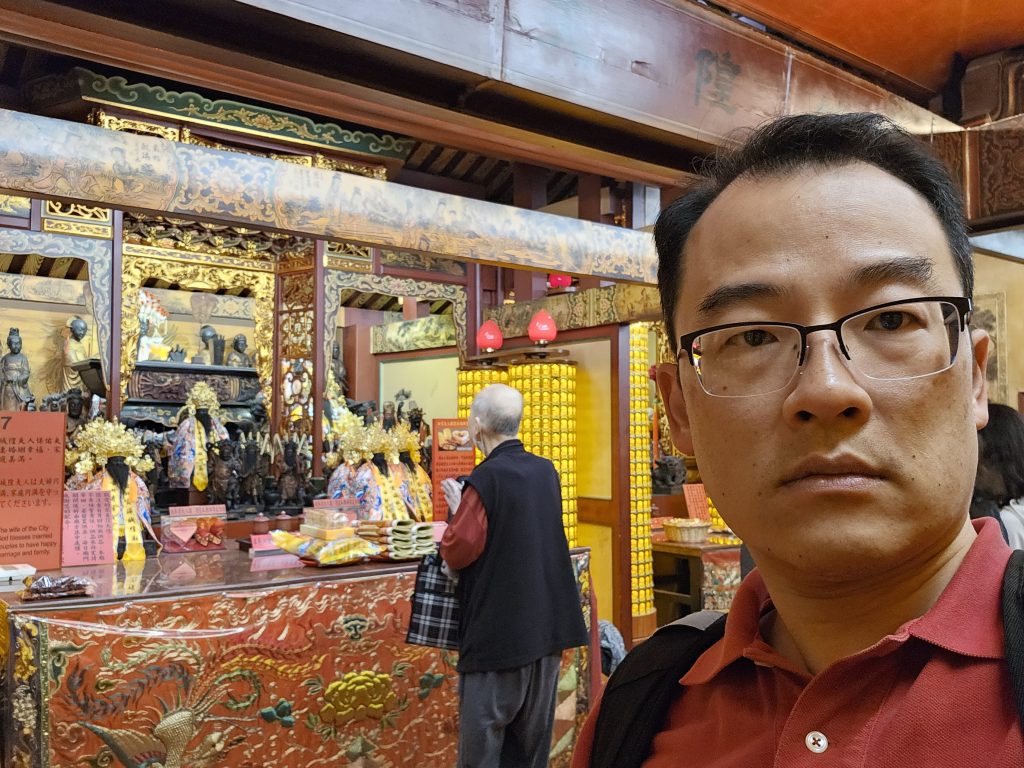
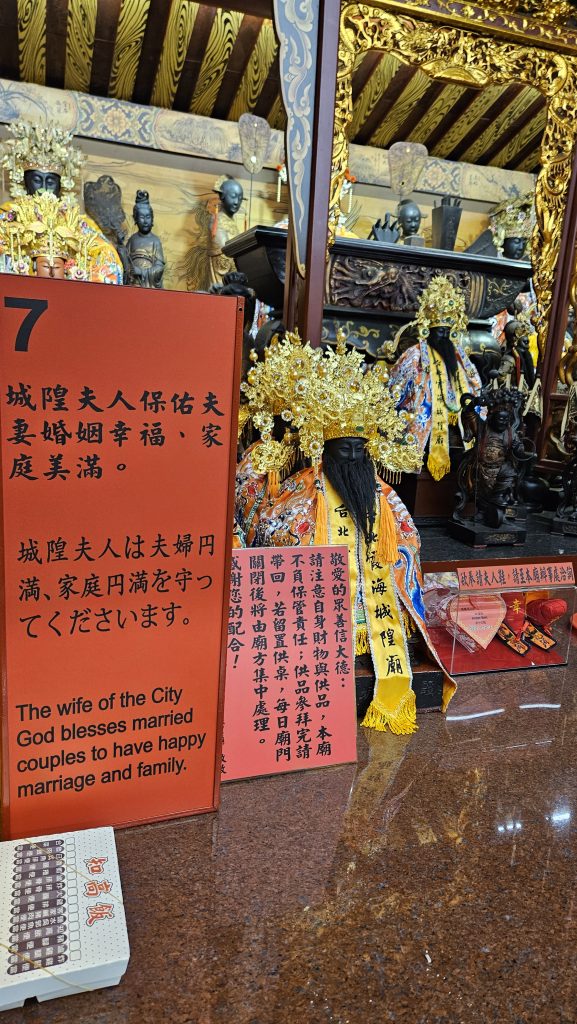
5/25/2025 Day 7 – Full Circle at the Royal Palm Boulevard
On May 25, the language and cultural exchange with the six students from National Taiwan University brought me back to my alma mater. We walked along the Royal Palm Boulevard from the main entrance toward the library, chatting about the university’s history and campus life. I used to ride my bike down that boulevard!
The six students were in their first year, and I was truly grateful for their willingness to spend a Sunday afternoon with us, especially since final exams were just a week away. We toured several buildings on campus, many of which hold vivid memories from my own college years.
Who would have thought that one day, I would be co-leading a student group back to this university 25 years later? Life really is a journey full of surprises.
When I was a college student, the idea of becoming a college professor never once crossed my mind. Yet here I am, watching my Bucknell students engage joyfully and curiously with students from NTU. I am honestly speechless.
I know that our students will learn a great deal through this kind of cultural exchange. They come from different parts of the world with different worldviews, and this experience allows them to grow in ways that no textbook ever could. Nothing beats this kind of experiential learning, and I feel incredibly lucky to be part of this trip.
I am proud to say that, while being a college professor may not be the most high-paying job, it is absolutely one of the most intrinsically rewarding.
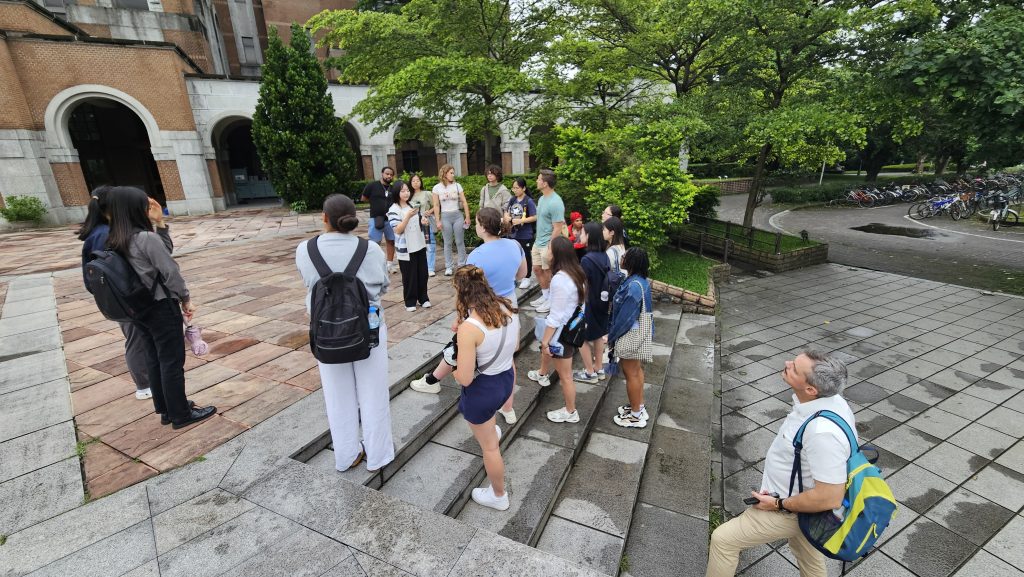
5/24/2025 Day 6 – Negotiating at the Taipei Jade Market
Visiting the jade market in Taipei is a unique cultural experience, especially for those interested in local craftsmanship, souvenir shopping, or practicing negotiation skills in a real-world setting. However, it is important to approach the market with informed expectations and an open mindset.
Understanding the Market
I am not sure the percentage of the items sold at the jade market are authentic, and how much are mass-produced by factories. unless you are an expert, it is hard for you to tell part high-quality authentic jade from mass-produced ones. In any case, these pieces are primarily decorative. As long as you think they are beautiful, that’s enough, and try not to pay premium just because the vendor tell you those are “real”.
Vendors usually have low procurement costs. Based on the items that I bought at the jade market, I later found that I can buy the same things online for less than 10% of their initial asking prices! With this in mind, you should not feel uncomfortable when bargaining. Negotiation is an expected and accepted part of the shopping experience in the market.
How to Bargain Effectively
Here are some practical strategies for successful negotiation at the Taipei jade market:
Show Interest Calmly
Begin by browsing quietly. When you see an item that you like, examine it carefully. Compliment the piece, mention its craftsmanship, color, or design. This helps establish rapport with the seller and shows genuine interest, which can make them more receptive to negotiation. Don’t ask a lot of questions on things you do not want to buy, avoiding wasting everyone’s time.
Make a Low Initial Offer
Sellers typically inflate their starting prices. A reasonable counteroffer might be no more than 50% of the asking price. Sometimes, lower offers are acceptable, depending on how determined the seller is to close the sale. Be respectful, but firm in your counter.
Use Silence and Walk-Away Power
If the seller does not meet your offer or come close, try stay silent for a while and see if the seller makes a better offer. If nothing happens after a while, then begin to walk away slowly. This is a classic tactic. Often, the vendor will call you back and make a better offer. If that happens, you are in a strong negotiating position, do not hesitate too long, as indecision can weaken your leverage.
Bundle for Better Deals
Another strategy is to ask, “What if I buy more?” Vendors frequently provide deeper discounts for bulk purchases. Even if you are only planning to buy one item, the response can give you insight into their bottom-line pricing. You can then use this information to negotiate a better price for a single item by offering slightly above that bulk rate.
Be Fair and Respectful
Remember, even though you may find similar items online for a fraction of the price, the jade market provides a unique shopping experience. Sellers incur costs for renting space, transporting goods, and engaging directly with customers. It is fair to offer a reasonable premium for the added value of human interaction, convenience, and immediacy.
Final Thoughts
Negotiating at the jade market is as much about cultural engagement as it is about making a purchase. Stay respectful, be prepared, and enjoy the experience. Whether or not you walk away with jade, you will leave with a deeper understanding of how informal markets operate, and maybe a story or two to share.
5/23/2025 Day 5 – Shrimp, Screams, and Skewers: A Night to Remember
On May 23rd, I took the group to do something I had not done in over 30 years: shrimp fishing! I was genuinely excited while planning the trip. To prepare, I even watched quite a few YouTube videos to refresh my memory on how it is done. This time, though, my goal was not to catch as many shrimp as possible. My goal was to ensure that everyone had a memorable and unique experience and, of course, to successfully lead the group to the fishing spot using Google Maps. Let me just say being a tour guide is no easy job!
Although there were a few shrimp fishing spots near our hotel, many of them allow indoor smoking, which I wanted to avoid for the comfort of our group. I ended up choosing a place that is known for being especially welcoming to visitors from abroad. In fact, some TV programs have even been filmed there, which made me feel more confident bringing students. I also wanted to be mindful and respectful since shrimp fishing is a beloved local pastime enjoyed by people from all walks of life. I was not sure how our group, clearly visitors, would be received as we learned and participated in something new for many of us. To help ensure a smooth experience, I selected a slightly farther location with a reputation for hospitality. Thankfully, the evening went quite well.
To my surprise, many students caught shrimp within minutes of sitting down. At first, I had to run around showing people how to unhook shrimp from their lines. However, as time passed, everyone got the hang of it. Some even started posing with their catch for photos. There were a few screams here and there when shrimp jumped in their hands; I guess it really was a brand-new experience for many of them. The hour flew by, and by the end, the group had caught enough shrimp that everyone got to taste some shrimp.
The most interesting part might have been the grilling prep. Students had to wash their shrimp, remove the legs and long antennae, skewer them, coat them in salt, and then place them, still alive, on the grill. Not everyone could bring themselves to go through all the steps. Some needed help, and those students, I must say, have very kind hearts. I was familiar with the process, so I ended up helping quite a few of them.
Professor Young turned the moment into a teaching opportunity, reminding us that every living creature has a purpose and can feel suffering. He even cited an academic paper and encouraged the students to read it. I truly appreciated his perspective. As humans, sitting comfortably at the top of the food chain, we have the power to choose what we eat, plants or animals. I feel fortunate to have been born human in this lifetime. But if we follow Buddhist thinking, who knows what I might come back as in my next life? Maybe I will be one of those poor shrimp in the pond.
Anyway, I do hope the shrimp know that their sacrifice was not in vain. They were deeply appreciated, and yes, they tasted delicious. Thank you, shrimp.
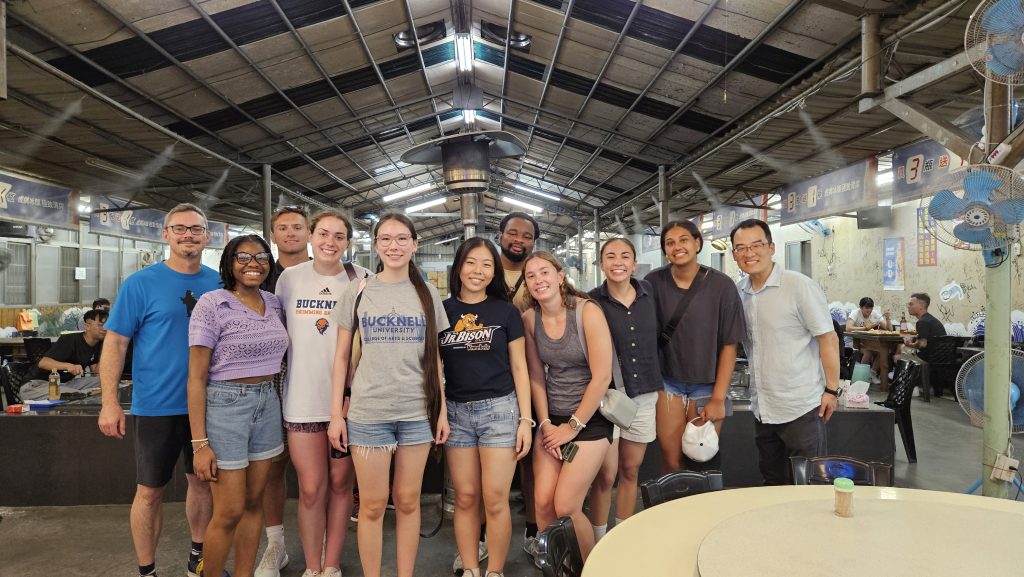
5/22/2025 Day 3 – A Journey of Spirit and Heritage: From Temples to Treasures
I really liked today’s itinerary. It felt like a spiritually enriching day in the program, and I have a feeling there will be many more like this.
In the morning, we visited 龍山寺 (Longshan Temple) and 行天宮 (Xingtian Temple). Longshan is rooted in Buddhism, while Xingtian is primarily a Daoist temple. Both places were filled with worshippers, some listening to lectures, others praying, making offerings, or simply sitting quietly in corners of the temple without appearing to do anything in particular. Students were asked to take notes and make direct observations about the architecture, the people, and their behaviors, and then compare and contrast the two temples. I was so glad to see every student fully engaged, frequently jotting down notes, asking thoughtful questions, and exploring the temples on their own. There is nothing better than this kind of immersive, experiential learning.
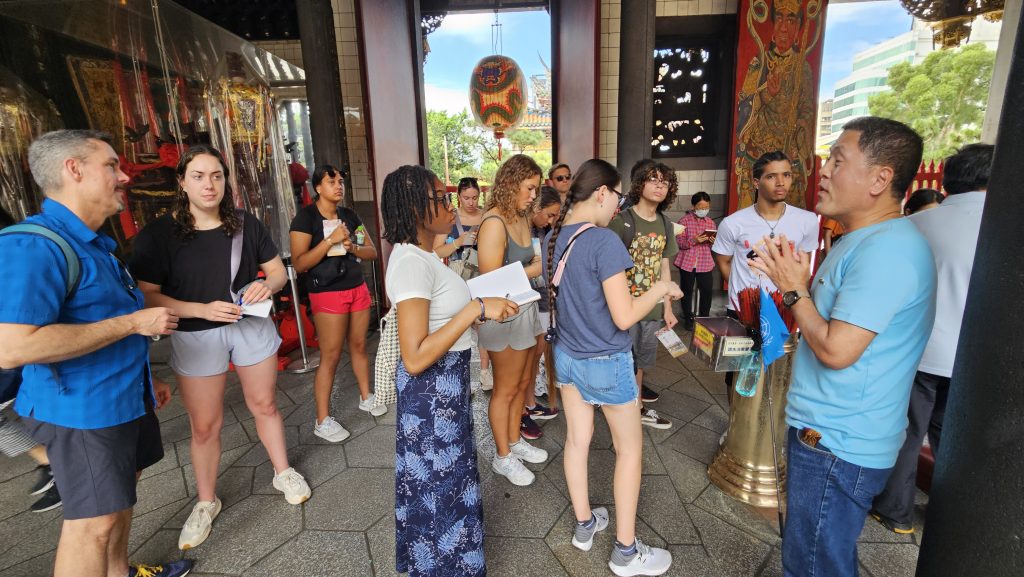
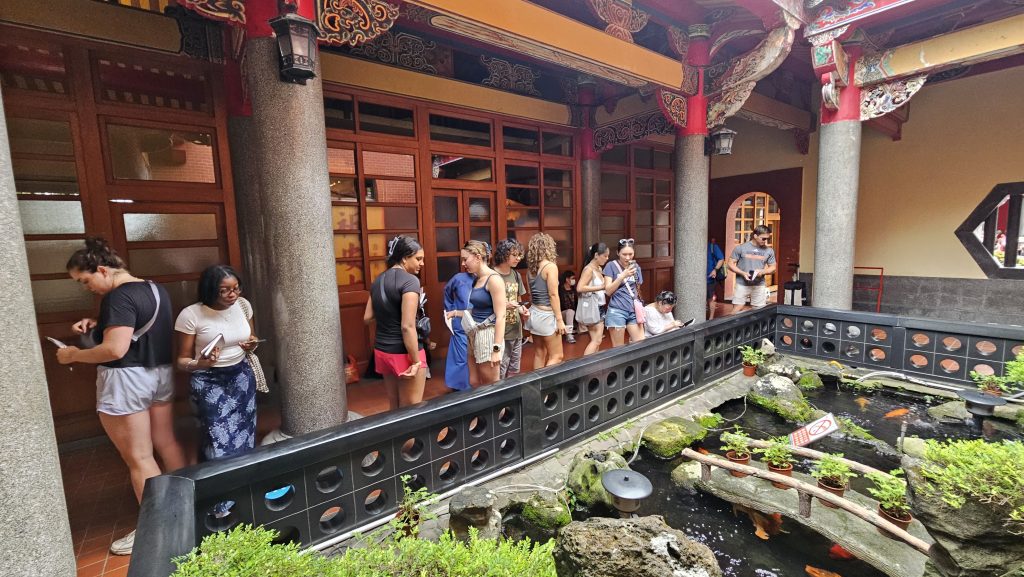
Although I grew up in Taipei and visited plenty of temples while I was living here, I usually just followed my family’s lead, doing whatever they asked or expected. I do not recall ever slowing down to observe people, architecture, or rituals with intention. I never stopped to ask why temples were designed a certain way. I certainly did not notice the differences between Buddhist and Daoist temples, nor did I even understand that they represented different religious traditions. Looking back, I realize how ignorant I was. Today, I am grateful for the local guide and for Professor Young, whose deep knowledge helped both the students and me gain a much richer understanding of these sacred places and their cultural significance.
In the afternoon, we moved on to the famous National Palace Museum. The collection there includes artifacts dating back thousands of years. By browsing through such a wide range of pieces, some artistic, some functional, we were able to trace the evolution of dynasties, shifting ideals of beauty (both in people and objects), and key historical events, all told through these well-preserved items.
All that fascinating history came to life behind glass displays. Can you believe that, in ancient times, porcelain was more valuable than gold? Or that someone managed to carve a piece of jade into interlocking chains? Or that there is an ivory carving with 21 layers—each able to move independently? You have to wonder how people accomplished these feats without modern technology. It is mind-blowing.
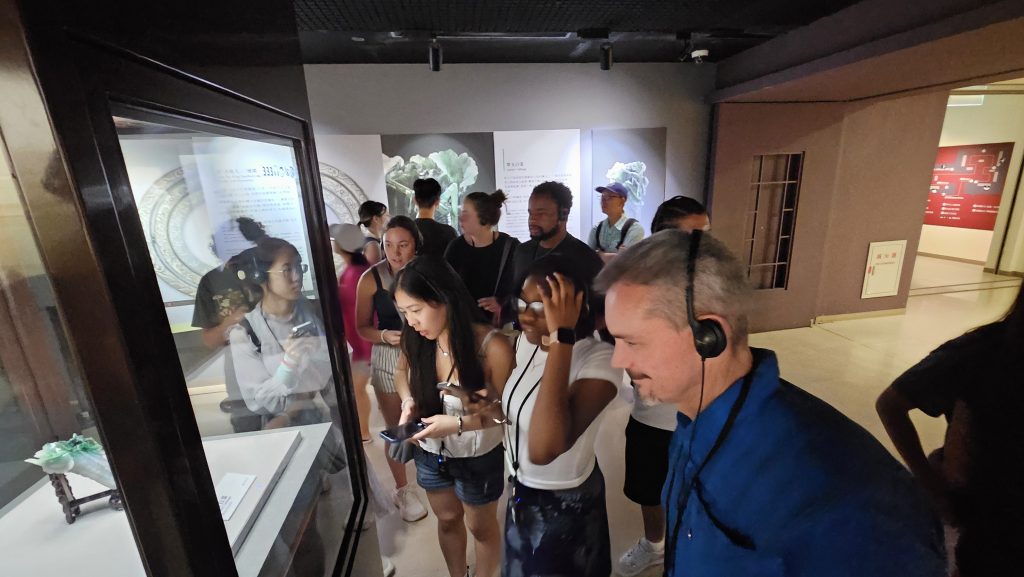
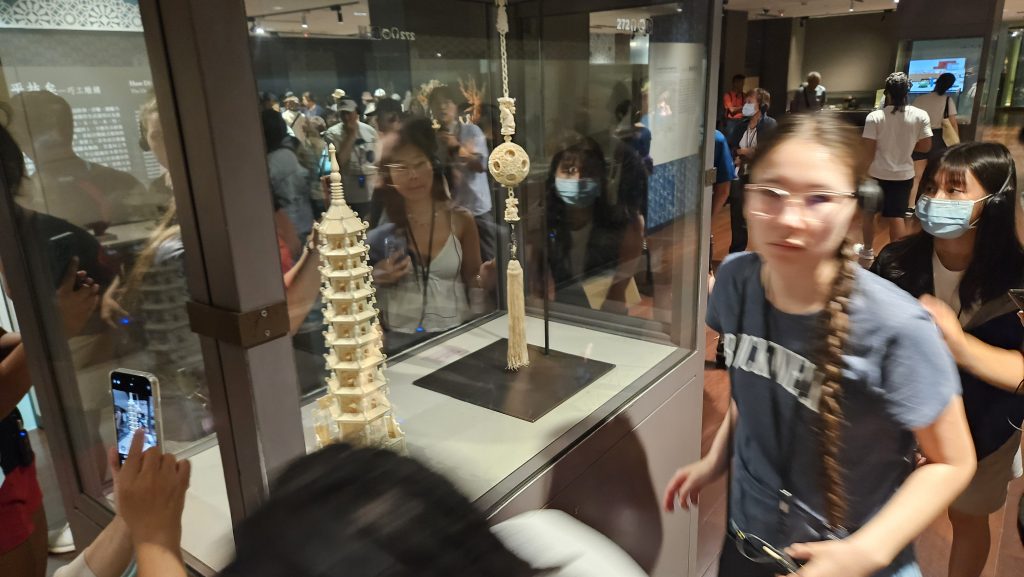
We wrapped up the tour with a short stop at the souvenir shop. The replicas of the ancient artifacts were all so cute and detailed. I did not buy anything; jet lag had kicked in by that time, and I was tired and ready to rest. But the students all looked cheerful and energetic. Maybe it is just me who is feeling the jet lag?
5/21/2025 Day 2 – From Nervous Applicant to Proud Educator
This Bucknell in Taiwan program has been incredibly rewarding for me on many levels, even though it is only the second day.
In the morning, we visited the American Institute in Taiwan (AIT), and in the afternoon, we toured Supply Chain Management Solution and Celinius Co., Ltd. The afternoon company visits were joyful and fascinating, especially because the topics discussed closely aligned with my teaching and scholarship. The speakers not only shared well-prepared slide decks but also brought real parts and product samples for the students to touch and explore. It gave everyone a hands-on understanding of how their clients benefit from the manufacturing capabilities of Taiwan and other Asian countries.
For today’s reflection, though, I want to focus on our visit to AIT, because the experience was deeply personal and emotional for me.
More than 20 years ago, I began my journey toward the “American dream.” My first step was to pursue an MBA in the United States. As a Taiwanese citizen, I had to apply for a student visa through AIT. I still remember how nervous I was on the day of my interview. I was not confident in my English, and the entire process felt intimidating. AIT was a highly secure facility, and entering it required a full-body screening, just like going through TSA at the airport. No phones were allowed inside. Sitting in the waiting area, waiting to be called, I was nervous. I do not remember the details of the interview, but I remember the enormous relief when I was eventually notified that my F-1 visa had been approved.
Fast forward two decades: I never imagined I would one day return to AIT; not as a nervous applicant, but as a university professor leading a group of students on an educational visit. The institute is now in a new building in a different part of Taipei, but the strict security measures remain the same. What had changed profoundly was how I felt.
Walking through those same secure doors guarded by officers, I was no longer anxious. Instead, I felt a strong sense of pride. The officials we met were warm, engaging, and welcoming. In a bright, clean, and beautiful conference room, they delivered a thoughtful presentation on Taiwan’s economy and its strong trade relationship with the United States. I felt proud, proud of Taiwan’s growing role in global trade, proud that this is where I come from, and proud of my students for conducting themselves with such professionalism and curiosity. Most of all, I was proud to represent Bucknell in this moment.
Although I held my composure, I felt emotional inside. The last 20 years have not been easy, but sitting in that room today made me realize how far I have come. I am doing something deeply meaningful and rewarding, creating educational experiences for students that I could have only dreamed about two decades ago. And for that, I am so proud.
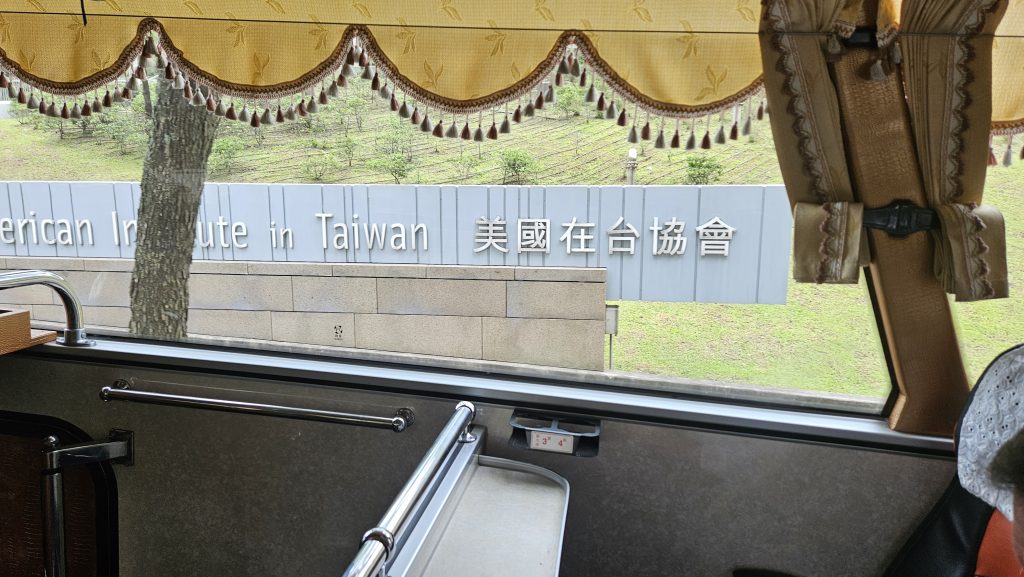
5/20/2025 Day 1 – Returning to the Chiang Kai-shek Memorial Hall
Today, our group visited the Chiang Kai-shek Memorial Hall. The 89 steps leading up to the main hall would not have been a challenge if it were not for the heat of our first day in Taiwan and the 16-hour intercontinental flight. Despite the bodily discomfort, the exciting experience set the tone for our journey.
Having grown up in Taiwan, this was not my first visit to the memorial. However, this time, I had the opportunity to explore the first floor of the building, a section I had not visited before. The air-conditioned space was to the rescue! This area has a collection of historical newspaper clippings, articles, and photographs. As I walked through the exhibits, memories from my upbringing surfaced vividly. Events that once felt nothing unusual now resonated with great significance.
With the insights provided by our local guide, Peter Lee, I began to understand the rationale behind many of these historical events, many of which were tragic. The clarity was both enlightening and, at times, shocking. It struck me deeply that these were not just chapters from a history book but moments from my own life. Living through an authoritarian regime and under martial law for much of my time in Taiwan has given me a unique perspective. Now, having spent nearly two decades in the United States, I find myself cherishing the freedoms and democratic values that both Taiwan and the U.S. uphold.
This visit has deepened my understanding of my culture and its history. The stories behind those old photos and news articles are complex and evoke emotions that words cannot fully capture. I am profoundly grateful for the Bucknell in Taiwan program. It has provided me with an opportunity to reconnect with my roots and reflect on the journey that has shaped who I am today.
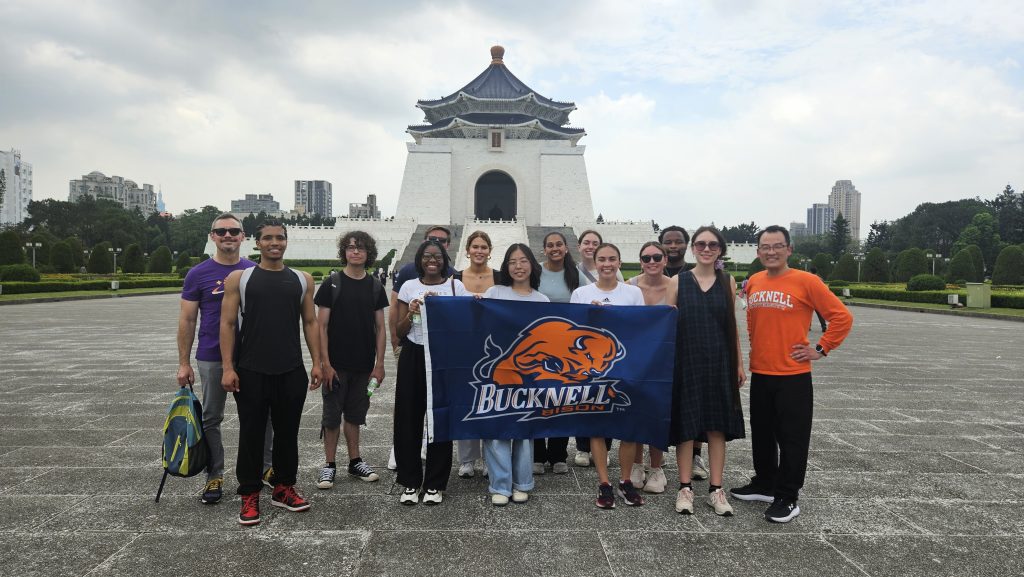
You pointed out some really interesting things from our visit at the National Palace Museum. I was also very shocked that porcelain was valued more than gold and cannot imagine how they were able to carve 21 layers into ivory!